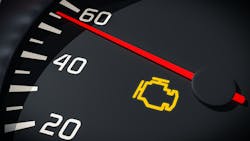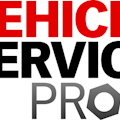10 most common check engine light-related repairs
CarMD.com Corporation released its 2023 CarMD Vehicle Health Index, an annual study of check engine light-related car repair trends.
With new car inventory still scarce, many lessees have opted to purchase vehicles at lease end versus trading them in, driving up the average vehicle age, and impacting the type and cost of repairs.
The 10 most common check engine light-related repairs in 2022 and the average cost to make that repair, including parts and labor:
- Replace catalytic converter(s), $1,313
- Replace oxygen sensor(s), $242
- Replace ignition coil(s) and spark plug(s), $392
- Replace mass air flow sensor, $303
- Tighten or replace fuel cap, (free to tighten and $25 on average to replace)
- Replace EVAP canister purge control valve, $137 (this repair is trending up from no. 8 last year)
- Replace ignition coil(s), $214 (this repair is trending down from no. 6 last year)
- Replace fuel injector(s), $424 (this repair is trending down from no. 7 last year)
- Replace thermostat, $239
- Reprogram powertrain control module, $109 (new to the list this year)
Other key findings:
- Car repair costs up amid aging vehicle population. In 2022, car repair costs were up 2.8 percent overall, totaling $403 on average. Labor costs were actually down half a percent, which CarMD partially attributes to more DIYers doing their own repairs and competition among auto repair shops. But in a continuing upward trajectory, parts costs were up 4.7 percent. Factors that likely played a role in this increase include continued supply chain issues, inflation and an increase in pricier car parts failing as consumers hold on to vehicles longer than ever before.
- Vehicle age impacts check engine light problems. CarMD found that model year 2007 and 2008 vehicles were most likely to need a check engine light-related repair in the past year, with new (still under warranty) 2021 and 2022 cars and trucks least likely to have an issue.
The 2023 Index statistically analyzes more than 17 million failures and recommended repairs for vehicles in the U.S., over the past calendar year. The data comes directly from each vehicle's OBD-II system, reported by millions of vehicle owners and the professionals who service them. The failure and fix data are validated by CarMD's network of ASE-certified technicians.

